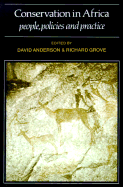Book contents
- Frontmatter
- Contents
- Preface
- List of contributors
- Introduction: The scramble for Eden: past, present and future in African conservation
- Part One Conservation ideologies in Africa
- Introduction
- 1 Early themes in African conservation: the Cape in the nineteenth century
- 2 Chivalry, social Darwinism and ritualised killing: the hunting ethos in Central Africa up to 1914
- 3 Colonialism, capitalism and ecological crisis in Malawi: a reassessment
- 4 Conservation with a human face: conflict and reconciliation in African land use planning
- Part Two Wildlife, Parks and Pastoralist
- Part Three Conservation priorities and rural communities
- Part Four Consequences for conservation and development
- Index
2 - Chivalry, social Darwinism and ritualised killing: the hunting ethos in Central Africa up to 1914
Published online by Cambridge University Press: 04 April 2011
- Frontmatter
- Contents
- Preface
- List of contributors
- Introduction: The scramble for Eden: past, present and future in African conservation
- Part One Conservation ideologies in Africa
- Introduction
- 1 Early themes in African conservation: the Cape in the nineteenth century
- 2 Chivalry, social Darwinism and ritualised killing: the hunting ethos in Central Africa up to 1914
- 3 Colonialism, capitalism and ecological crisis in Malawi: a reassessment
- 4 Conservation with a human face: conflict and reconciliation in African land use planning
- Part Two Wildlife, Parks and Pastoralist
- Part Three Conservation priorities and rural communities
- Part Four Consequences for conservation and development
- Index
Summary
The central significance of the Hunt in the ideology of late nineteenth-century imperialism has never been fully realised. The importance of the Hunt can be identified at every level of the theory and practice of the imperial ethos. It played a part in popular imperialism in Britain. In Africa it acted as a vital point of interaction between Africans and Europeans. Explorers, prospectors, missionaries and pioneers were also hunters. The ivory-hunting frontier in southern Africa was at one and the same time a prime impulse to the interior and the marker of the white advance. Most early colonial administrators were hunters as were the majority of European settlers. The Hunt was extolled by the military as the vital preparation for and adjunct of war. As African access to hunting was progressively reduced, the Hunt became not only the symbol of European dominance, but also the determinant of class within that dominance. As conservation policies developed at the turn of the century, the Hunt became the preserve of famous travellers, high-ranking officers, politicians, royalty and aristocrats, as it had been in India for some time. Conservation was promoted, in part, because these hunters deprecated the plain man's hunting, whether the unbridled depredations of the settler, or, above all, the commercial activities or survival techniques of Africans.
- Type
- Chapter
- Information
- Conservation in AfricaPeoples, Policies and Practice, pp. 41 - 62Publisher: Cambridge University PressPrint publication year: 1988
- 4
- Cited by

